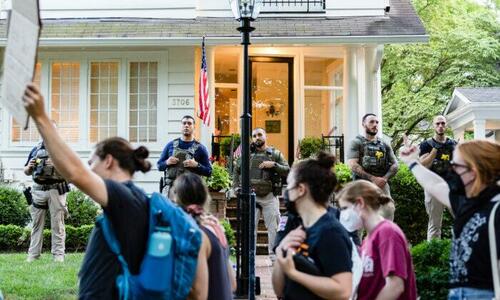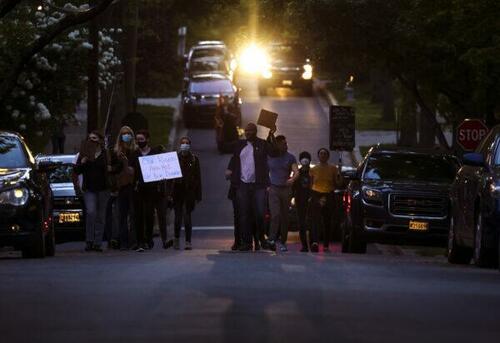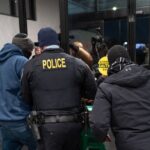
Authored by Joseph Lord via The Epoch Times (emphasis ours),
A Senate Republican revealed during a March 28 hearing that an internal Department of Justice (DOJ) memo dissuaded U.S. Marshals from arresting protestors in violation of laws against picketing the homes of judges.

The materials revealed during the hearing show that U.S. Marshals were explicitly directed not to arrest protestors at the homes of Supreme Court (SCOTUS) justices.
“People want justice to be blind,” said freshman Sen. Katie Britt (R-Ala.), who unveiled the findings during a hearing of the Senate Appropriations Committee. Attorney General Merrick Garland appeared before the panel to testify on the DOJ side of President Joe Biden’s proposed budget.
Section 1507 of U.S. Code prohibits the picketing of Supreme Court (SCOTUS) justices or other federal judges to change the outcome of a legal case. But when protestors demonstrated at the homes of conservative justices to protest their leaked abortion decision in June 2022, U.S. Marshals made few arrests in connection to the statute.
This, Britt revealed, was not a mistake. Rather, she showed that a DOJ memo had directly dissuaded agents from making arrests on the basis of Section 1507, instructing them to arrest protestors only as a “last resort” to protect the justices.
Section 1507 explicitly prohibits “picketing” or “parading” near the residences of judges or justices in order to influence the outcome of a case.
A few weeks earlier, Garland fielded questions from the Senate Judiciary Committee on his agency’s failure to prosecute those picketing the homes of justices.

During that and other testimony, Garland has insisted that the decision to arrest protestors lies with U.S. Marshals.
“U.S. Marshals have the authority to arrest anyone under that statute or any other federal statute,” Garland said. “The attorney general does not make the decision to arrest. The Marshals on the scene—they do make the decision of whether to arrest.”
But newly uncovered materials used to train Marshals to protect the homes of SCOTUS justices show that they were “actively discouraged” from making arrests on grounds of this statute, Britt said.
“Those materials show that the Marshals likely didn’t make any arrests because they were actively discouraged from doing so,” Britt said.
The training materials told the Marshals “to avoid, unless absolutely necessary, any criminal enforcement action involving the protestors.”
Marshals were also told, “Making arrests and initiating prosecutions is not the goal of the [Marshal Service] presence at SCOTUS residences.”
“The ‘not’ is actually italicized and underlined,” Britt noted.
The next slide of the training “not to engage in protest-related enforcement actions, beyond those that were strictly and immediately necessary and tailored to ensure the physical security of the justices.”
Read more here...
Authored by Joseph Lord via The Epoch Times (emphasis ours),
A Senate Republican revealed during a March 28 hearing that an internal Department of Justice (DOJ) memo dissuaded U.S. Marshals from arresting protestors in violation of laws against picketing the homes of judges.

The materials revealed during the hearing show that U.S. Marshals were explicitly directed not to arrest protestors at the homes of Supreme Court (SCOTUS) justices.
“People want justice to be blind,” said freshman Sen. Katie Britt (R-Ala.), who unveiled the findings during a hearing of the Senate Appropriations Committee. Attorney General Merrick Garland appeared before the panel to testify on the DOJ side of President Joe Biden’s proposed budget.
Section 1507 of U.S. Code prohibits the picketing of Supreme Court (SCOTUS) justices or other federal judges to change the outcome of a legal case. But when protestors demonstrated at the homes of conservative justices to protest their leaked abortion decision in June 2022, U.S. Marshals made few arrests in connection to the statute.
This, Britt revealed, was not a mistake. Rather, she showed that a DOJ memo had directly dissuaded agents from making arrests on the basis of Section 1507, instructing them to arrest protestors only as a “last resort” to protect the justices.
Section 1507 explicitly prohibits “picketing” or “parading” near the residences of judges or justices in order to influence the outcome of a case.
A few weeks earlier, Garland fielded questions from the Senate Judiciary Committee on his agency’s failure to prosecute those picketing the homes of justices.

During that and other testimony, Garland has insisted that the decision to arrest protestors lies with U.S. Marshals.
“U.S. Marshals have the authority to arrest anyone under that statute or any other federal statute,” Garland said. “The attorney general does not make the decision to arrest. The Marshals on the scene—they do make the decision of whether to arrest.”
But newly uncovered materials used to train Marshals to protect the homes of SCOTUS justices show that they were “actively discouraged” from making arrests on grounds of this statute, Britt said.
“Those materials show that the Marshals likely didn’t make any arrests because they were actively discouraged from doing so,” Britt said.
The training materials told the Marshals “to avoid, unless absolutely necessary, any criminal enforcement action involving the protestors.”
Marshals were also told, “Making arrests and initiating prosecutions is not the goal of the [Marshal Service] presence at SCOTUS residences.”
“The ‘not’ is actually italicized and underlined,” Britt noted.
The next slide of the training “not to engage in protest-related enforcement actions, beyond those that were strictly and immediately necessary and tailored to ensure the physical security of the justices.”
Read more here…
Loading…






